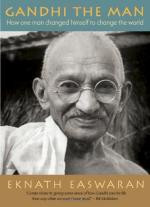
|
| Name: _________________________ | Period: ___________________ |
This quiz consists of 5 multiple choice and 5 short answer questions through Gandhi the Man.
Multiple Choice Questions
1. Finding himself happier and healthier for the change, Gandhi shifted his attention to what?
(a) Studying religion.
(b) Looking for a new wife.
(c) His diet.
(d) Understanding British culture.
2. Easwaran opens the chapter entitled Mother and Child by asking the question of how such a personal evolution could have come about, and how the evolution of a single person could effect what?
(a) Such sweeping interpersonal change.
(b) Such a minor political and interpersonal change.
(c) Such sweeping political and interpersonal change.
(d) Such sweeping political change.
3. The idea was detachment from the result of one's actions, so that one's focus is on what?
(a) One's needs.
(b) God.
(c) Others.
(d) The spirit of his actions.
4. In order to make his teaching more accessible, Gandhi established what?
(a) Temples.
(b) Ashrams.
(c) Parades.
(d) Churches.
5. On what does one who loves the Lord of Love focus?
(a) Living in the spirit of love.
(b) How to love oneself.
(c) Giving love to others.
(d) Where to find love.
Short Answer Questions
1. Easwaran explains that Gandhi was quoting what from Hindu scripture?
2. When were Gandhi and Kasturbai married?
3. Gandhi described the process as reducing oneself to zero, which is when?
4. When he was speaking against the violence between the Hindu and Muslims living in India, a young man came out of the crowd and greeted him with his hands at his heart before he did what?
5. Perhaps one of his most potent moments on the world stage came when what happened?
|
This section contains 331 words (approx. 2 pages at 300 words per page) |

|




